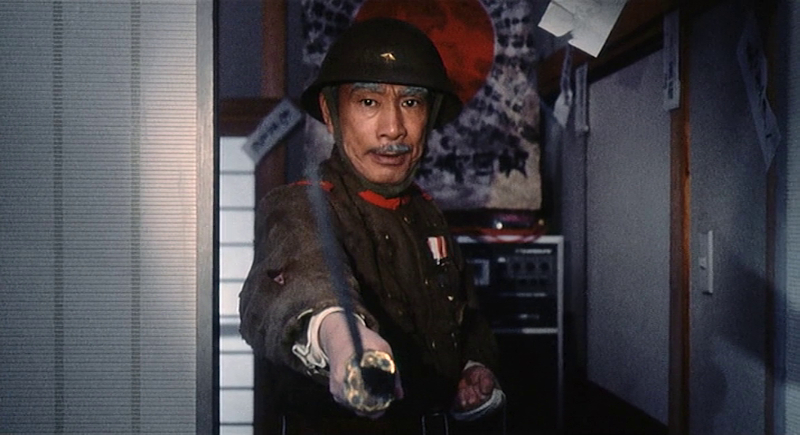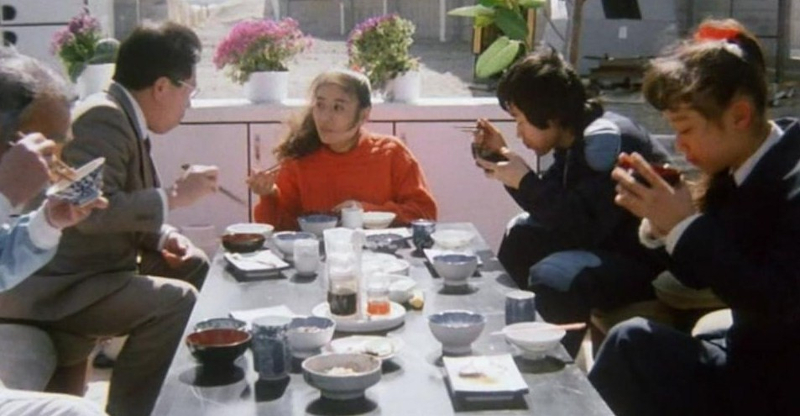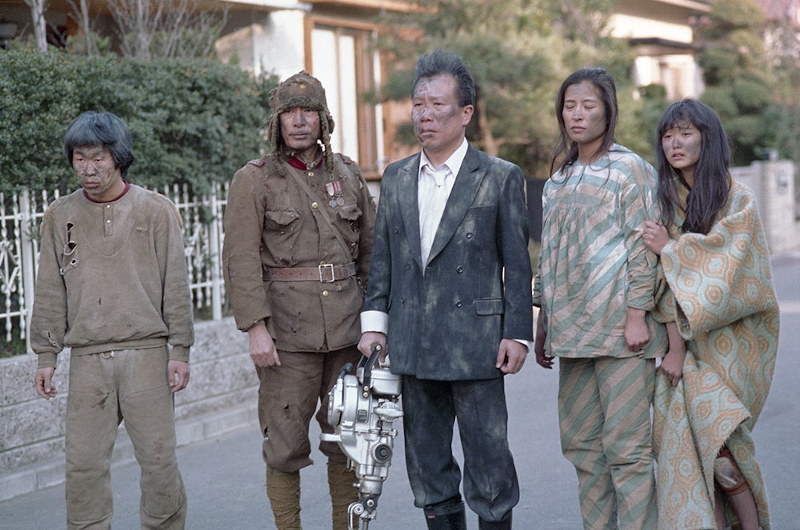Director – Sogo Ishii – 1984 – Japan – Cert. 18 – 105m
*****
After proudly moving into their first home as owner-occupiers, a family go berserk and destroy the building – out on Blu-ray on Monday, June 17th
This seemingly starts out as a conservative family drama. The family in question comprises father Katsukuni Kobayashi (Katsuya Kobayashi in his debut feature role), mother Saeko (Mitsuko Baisho who worked with directors Akira Kurosawa, Shohei Imamura and Kaneto Shindo), elder teenage son Masaki (Yoshiki Arizono from Ichi the Killer, The Happiness of the Katakuris, both Takashi Miike; Electric Dragon, 80,000 V, Sogo Ishii, all 2001) and younger teenage daughter Erika (Youki Kudoh from Typhoon Club, Shinji Somai, 1985; Mystery Train, Jim Jarmusch, 1989; Heaven’s Burning, Craig Lahiff, 1997). The Kobayashis move in to their first home as owner-occupiers which, although it’s a little on the small side, promises an idyllic existence. Father is the breadwinner with a nondescript office job, mother waters the plants and does the cooking and housework, the daughter wants to be an idol singer and the son is spending all his time studying for school and university in his room upstairs.

The first sign of things not being right comes when the father discovers a white ant, a species which can undermine buildings and which requires treatment to get rid of nests and infestation. On top of this, when the grandfather (Hitoshi Ueki from Ran, Akira Kurosawa, 1985; Only Yesterday, Isao Takahata, 1991) on the father’s side visits, it quickly becomes apparent that he’s looking for a place to live. The father attempts to accommodate him, digging through the living room floor to build him a room in the resultant basement. This acts as a catalyst to throw the family unit into turmoil.
Early in the wee small hours one morning, awakened by the sound of dad doing noisy building work in the dark, the family gather for an impromptu conference thrown together by dad, who serves coffee which turns out to be poisoned. He attempts to justify his intended killing of them all by saying they are all sick, and this course of action is the only solution. They, understandably, disagree and revert to more primal types.

Dad arms himself with the heavy-duty holdall power tool he’s been using to dig out the basement, complete with interchangeable digging, drill and other tool heads. Mum constructs a makeshift suit of armour from kitchen implements. The son arms himself with a metal baseball bat that could easily have served the biker warriors of Ishii’s earlier youth gang films. The hopelessly naive daughter, in a one-piece swimsuit, goes full idol singer as if this would somehow protect her from the social breakdown to come. Grandpa, meanwhile, puts on his soldier’s uniform wields a sword against, as he now sees it, the Chinese.
Various family members do battle with various others until dad hits on another solution: destroy the physical house which had initially held out so much promise. After the premises implode as a result, they set up house in a derelict area beneath two flyover lanes, where they have far more room than they did in suburbia.

There’s a sense here of both society redefining itself and a filmmaker doing the same at a crossroads in his career.
The family starts off following Japanese societal norms, but events prove too much for them and in the end, they just can’t do it. The father, initially euphoric at having taken his family out of the less than perfect public housing system and bought them a home they all seem to like, shifts to a position where the only way to atone for his failure as head of the family is to kill all family members, including himself.
His father, representing the generation that fought in the Second Sino-Japanese War and World War Two, is perfectly happy to rape his daughter, forgetting who she is and believing her to be, temporarily at least, enemy Chinese against whom an act of rape is perfectly justifiable. To contemporary eyes, this is arguably the single most disturbing element in the film and has earned it an 18 certificate in the UK, even though it’s more threat and bravado about rape than any more active or explicit perpetration.

Although she arms herself like a warrior, the mother’s position is essentially defensive, born out of the understanding that her husband has gone mad and a desire to protect her teenage kids. The teens are similarly reactive rather than proactive. The ones who want change and attempt to initiate it are the father and the grandfather.
In terms of the director’s filmography, this falls between his earlier, amateur dystopian biker gang movies Crazy Thunder Road (1980) and Burst City (1982) which shook Japanese cinema to its core and his subsequent string of unsettling SF / horror dramas which started a decade later with Angel Dust (1994). It’s an intimate family drama made with professional actors rather than friends of the director and arguably more like a conventional movie than anything Ishii had made previously, although as can be seen from the film’s subject matter it’s a long way from being conventional. Its sense of societal collapse recalls visionary, British writer JG Ballard, in particular High-Rise (published 1975).

Certain sequences – the father’s run from his office through the streets via a train and a bicycle to get home, along with his menacing his daughter with a huge, hand-held drill, and the late pixilated sequence whizzing around the collapsed family home – anticipate similar sequences in early Shinya Tsukamoto pixelation / live action hybrid features The Adventures of Denchu Kozo (1987) and Tetsuo the Iron Man (1989). It was Ishii’s first film to achieve international distribution and remains a key film in the reinvigoration of Japanese cinema in the 1980s.
The Crazy Family is released on Blu-ray by Third Window Films on Monday, June 17th. It was out in selected New York cinemas from Friday, April 19th and selected UK cinemas from Friday, April 25th.
Trailer:
Cinema screenings:
April 19 & 20 – New York City, USA
https://japansociety.org/film/directors-company-x2
UK Screenings
April 25 – London
Cinema Museum
April 25 – Bristol
Cube Cinema
April 26 – Derby
Derby Quad
April 26 – Glasgow
Offline (formerly GAMIS)
